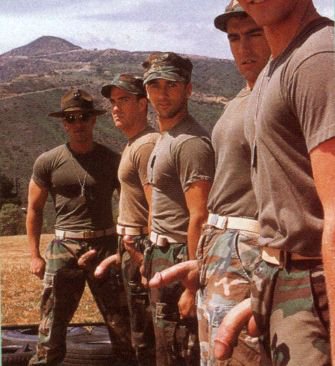 PROVIDENCE, RHODE ISLAND - Belle Pellegrino was a Marine private first class stationed in California in 1969 when she told her commanding officer she was gay. She endured two weeks of interrogation and humiliating questions from two male officers before she was kicked out.
PROVIDENCE, RHODE ISLAND - Belle Pellegrino was a Marine private first class stationed in California in 1969 when she told her commanding officer she was gay. She endured two weeks of interrogation and humiliating questions from two male officers before she was kicked out.On Friday, she marked Veterans Day with a handful of other veterans -- gay and straight -- by calling on Congress to repeal the "don't ask, don't tell" policy that bars people who are openly gay from serving in the military.
"'Don't ask, don't tell' is nothing more than the latest excuse for treating us as less than full citizens," said Pellegrino, 61, of Providence.
The policy also is driving skilled servicemen from the armed forces at time when recruiting is suffering, veterans and gay rights advocates said.
The Army was 6,627 recruits short of its goal of 80,000 for the year ending Sept. 30. The other branches met their goals but have far smaller recruiting needs.
"We need to do something," said Matt McTighe, a lobbyist for the Human Rights Campaign, a Washington-based group that works for gay rights. "This is one area where we've got troops willing to serve."
The group chose Providence to hold its national Veterans Day event in part because its Congressional delegation supports gay rights, McTighe said.
The Clinton administration introduced "don't ask, don't tell" in 1993. It prohibits the military from inquiring about service members' sexual orientation but requires it to discharge those who acknowledge being gay. More than 9,400 service members have been discharged under the policy.
The California General Assembly and a number of cities, including New York and Chicago, have passed resolutions asking Congress to repeal the policy.
Anne Wallbillich intended to make the Air Force her career when she signed up 1989. But four years later, she chose not to re-enlist because of 'don't ask, don't tell.' She didn't tell her commanding officer she was gay, and when she went to sign her discharge papers, he asked her if there was any way he could keep her from leaving.
"I said, 'No Colonel, I don't think there's anything you can do,'" said Wallbillich, 40, who now lives in North Smithfield and works as a hospital laboratory supervisor.
Wallbillich and other veterans said they hope legislators will support the Military Readiness Enhancement Act, a bill introduced in March that would allow gay service members to serve openly. Reps. Patrick Kennedy and Jim Langevin, both Rhode Island Democrats, support the bill.
Jeff Schmalz, 49, of Dartmouth, Mass., said he left the Army National Guard in June 2004 after 25 years of military service because he and his partner were discussing marriage and he feared the loss of his pension. Several friends who are commanding officers tried to persuade him to stay, Schmalz said.
"They said, 'Look, we don't want to lose people. We don't want to lose skilled people,'" he recalled. "But it wasn't his pension on the line."
from Boston.com
No comments:
Post a Comment